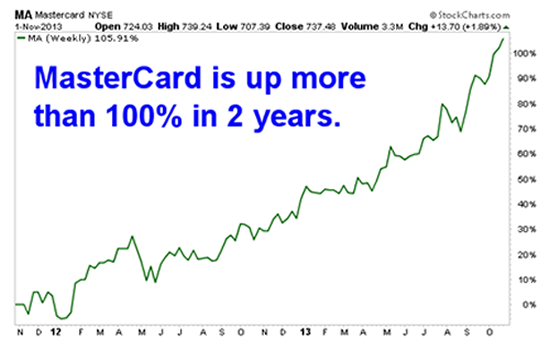My local grocery store introduced a radical initiative last month.
About half the traditional checkout stations were replaced by big banks of automated stations that let customers check themselves out on their own.
These machines are easy to use, give the customer the option for an independent check out and ultimately help the grocery store lower expenses, which reduces food inflation.
But the one drawback is they make it very difficult to use cash.
When was the last time you tried stuffing a few wrinkly $1 bills into a narrow slot? For me it was 1984 when I was playing Galaga at the local movie theater.
It's another nail in the coffin for 'The Death of Cash.' Not only do consumers continue to reject cash, the infrastructure also continues to migrate toward digital currency and electronic financial transactions. Even holdouts who want to use cash are being forced to adjust.
This powerful, long-term trend is creating a big opportunity to profit with one of the world's largest payment processers.
More than a billion of its products are in use across the globe. It's one of Warren Buffett's favorite companies. It has $7 billion in cash and equivalents on the balance sheet. It's also in the process of buying back $2 billion in stocks. That has already produced big gains, with shares more than doubling in just the last two years. Take a look below.

But if you missed out on that move, don't worry. There should be plenty more to come.
MasterCard, Inc. (NYSE: MA) is the second largest payment processor in the world, operating in more than 150 currencies and 120 countries worldwide. MasterCard isn't a high-risk bet on consumers paying off their credit cards like American Express Inc. (NYSE: AXP). The company charges a small fee per transaction. And as electronic financial transaction volume continues to surge, MasterCard is in position to cash in.
MasterCard continues to see steady growth in developed markets such as the United States and Europe where the death of cash is alive and well. But the biggest driver of growth will come from emerging markets where more than 90% of financial transactions are still conducted with cash and checks.
That's why MasterCard is targeting high-growth markets such as China, the Middle East and Africa, where purchase volumes were up 21% in the third quarter compared to 9% growth in the United States.
Those gains are being driven by a flurry of deals in key emerging markets.
In April, MasterCard inked a deal with China CITIC bank to issue cards in China and other regions in Asia. MasterCard followed that up with a deal for a strategic partnership with Alibaba Group, China's largest e-commerce company.
MasterCard also recently scored another victory in Myanmar, one of the region's fastest growing economies, announcing that one of the Southeast Asian country's largest banks, Kanbawza Bank, is now accepting MasterCard payments cards at ATMs across the country.
All three deals set the stage for more access to high-growth markets in China and Asia Pacific.
Latin America is also key for MasterCard's growth. In May, MasterCard announced its DataCash subsidiary, a global payment processor, was partnering with Redecard, one of Brazil's largest payment systems companies. The partnership will provide a comprehensive payment solutions system for merchants across the entire Brazilian market.
In addition, MasterCard continues to diversify its portfolio through innovative products and services, including e-commerce, mobile payment, prepaid cards, 'smart' cards and NFC (near-field communications) devices to capitalize on the highest-growth segments of e-commerce and payment processors.
MasterCard's dominant presence in high-growth markets has turned it into a financial powerhouse. The company recorded operating cash flow of $2.94 billion in the first three quarters of fiscal 2013.
That supported a recent 100% hike in its quarterly dividend, jumping from 30 to 60 cents. MasterCard is also using its cash to return value to shareholders, buying $345 million shares back during the quarter that leaves $912 million on its current buyback program.
That strong financial profile is a hallmark of the global leaders my colleague Elliott Gue profiles in his Top 10 Stocks for 2014. These stocks have beaten the market in seven of the past 10 years, because they routinely dominate their markets, pay increasing dividends, and repurchase billions in stock. To get more information on this unique set of stocks -- including names and ticker symbols -- click here.
Looking forward, analysts are calling for Mastercard's earnings growth to be 19% in the current fiscal year and 18% annually over the next five years.
Risks to Consider: Regulators have already been clamping down on the fees that payment processors can charge for debit and other financial transactions. Although MasterCard and Visa continue to produce impressive gains, further regulatory interventions would negatively affect earnings and sentiment.
Action to Take --> In spite of MasterCard more than doubling in the past two years, MasterCard still looks reasonably valued. Its forward PEG (price-to-earnings/growth) ratio of 1.39 is only a small premium to its peer average of 1.29 in spite of its leading market position. shares are up big in 2013, but with plenty of long-term growth ahead, MasterCard is a buy anywhere below $750.



